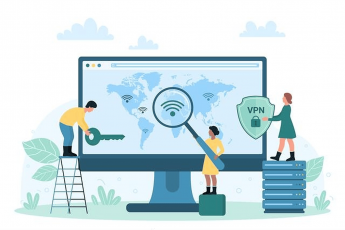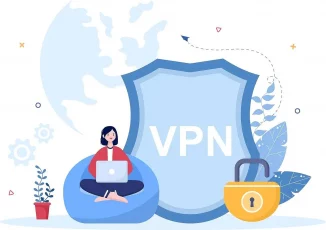Virtual Private Network (VPN) users can attest that the software is a helpful tool. But most of them, despite experiencing the security features, do not recognize the other lesser known benefits of a VPN.
Besides providing user data security, VPNs guarantee anonymity while surfing online. The technology even hides user location while online.
That’s the best part of using a VPN service; users get well-encrypted data when online. It prevents common online threats – giving users a remarkable browsing/streaming experience.
Few lesser known VPN benefits – Quick list
If you are already conversant with VPNs and need to quickly scan the list of their lesser known benefits to review your knowledge, then here it is for you.
- Privacy against web tracking websites
- Secure access to home networks
- Anonymous downloads
- Distance online shopping
- Prevent malicious attacks
- Avoid ISP tracking
- Bypass traffic shaping
- Secures public WiFi
- Streaming blocked content
- Campus internet security
- Affordable leased-line options and long-distance telephone charges
- Lower support costs
- Ensure network scalability
Increased online surveillance and more invasive regulations are the prime factors driving VPN use. In other words, more people have become more reliant on the software today. Whether for streaming, browsing, or accessing restricted sites, VPNs have become kings.

Among top VPN users are frequent travelers, online streamers, and torrenters. These groups use individual VPN services for specialized purposes – besides focusing on security. But the software presents more once activated on any device.
With that in mind, VPN services have proven helpful in recent times. But these services seem to offer more online solutions. Unfortunately, most users are unaware of these uses beyond online safety and anonymity.
Amazing things few people know a VPN could do
Most folks think a VPN can hide your location to ‘virtually’ locate them in their preferred country. But that’s only the beginning of what this security tool can do. This guide provides excellent insights into 13 lesser-known VPN uses you probably didn’t know about. Below you go with the hidden benefits of using a VPN service.
1. Privacy against web tracking websites

Today, several businesses are operating globally. Others are still local-based but continue to attract more customers. These enterprises often market their products to specific target markets.
As to achieve this, they focus on localized advertising. That involves marketing products based on customer needs. That is, businesses use specialized tools to reach their target market.
But how do they know what you need to buy?
With several websites out there, each needs to make money. So, the best way to do this is to track user traffic. It means scanning user IP addresses to identify their precise locations.
It also collects user data regarding search logs on search engines. That gives them an idea of any product you are searching for online.
For example, you search boxing gloves on Amazon. When you visit other websites, you will see similar ads for boxing gloves. It doesn’t matter that you didn’t put effort into browsing boxing gloves on these other sites.
That is a type of web tracking users experience every day. Because it is a concern, a VPN is an excellent countermeasure tool. The service masks your real IP address and prevents these annoying behaviors.
2. Secure access to home networks
A home network means you have many devices – laptops, desktop computers, and mobile devices. What’s more, these devices are often connected to the same home network.
Each of these devices has its own storage. But your primary desktop computer harbors more personal files. You store work and other files and data on it; others even have a NAS setup.
At some point, you may need to access this information remotely. And hackers are often on the lookout. So whether it is your PC or NAS, you need to access them securely.
It is where a VPN helps you encrypt the data and access it securely. It keeps your data secure and prevents events of data loss. Besides, it contains hacking activities when you connect with your devices.
3. Anonymous downloads
File torrenting and peer-to-peer downloads have become increasingly popular today. Unfortunately, most downloads of these kinds are illegal because they violate copyright policies.
But some other downloads are legal, such as downloading the Linux distro. But either way, these downloads have substantial risks to users. Above all, torrenting sites are unsafe and pose a threat to personal data.
Most torrent websites use torrent trackers to monitor users’ systems. More so, they keep logs that can be turned in to authorities. Others may sell this information to third parties.
Because these sites use IP addresses to facilitate such activities, here is where VPN uses come in handy. Using a torrenting VPN helps you secure your data and avoid tracking. That enables you to use torrents securely and privately.
4. Distance online shopping

People travel daily either abroad or in neighboring countries. They sometimes need to order a product online for it to be delivered to their homes. Unfortunately, it becomes impossible because of a country-specific website.
Most online retailers use location-based websites. Such a technique has several benefits for the company. Among them is delivery purposes.
Using a VPN changes your IP address, disguising it to be from your country. So, you can connect to a home country server and place your order. It applies to any country, provided you have the right VPN.
You’ll proceed to make payments and get your product shipped to your home address. Indeed, it is one of the many lesser known but helpful VPN benefits.
5. Prevent malicious attacks
Cases of hacking devices have become common nowadays. Most people think only established businesses are at risk. But hackers target any system they come across.
However, today’s routers have firewalls designed to provide security against cyberattacks. Again, users can install specific software to enhance their security. These are among the top ways to remain anonymous online.
Mostly, hackers use IP addresses to find your network. Using a VPN provides a secure mechanism to prevent this. Besides anonymity, you can use a VPN to mask your IP address.
The software connects to a different server off-site and assigns a different IP address. This new address mimics your home network. Hence, any attack will only end up on the VPN server.
The VPN, therefore, becomes an extra defense against hackers. It also prevents other malicious activities on the internet. So another lesser known VPN benefit is that it ensures you remain safe from potential cyberattacks.
6. Avoid ISP tracking
ISPs have continued to become a concern for most users. The technique used in ISP tracks subscriber data, which invades privacy. And anything that accesses user data is a threat to sensitive information online.
What they do with the data is what worries most users. Besides, these habits seem to target advertising purposes. This alone makes it straightforward for users to seek anonymity.
One of the most significant concerns is that ISPs can now sell user logs or any other data collected to advertisers. These include location data, app usage, and surfing history. That said, there’s a need to block ISP tracking.
As to become anonymous, a VPN is the solution. Install a reliable VPN to all your devices to prevent ISP tracking. The prime intent, in this case, is to prevent ISP from accessing your data.
7. Bypass traffic shaping

Traffic shaping is yet another cheeky technique that ISPs use to save their bandwidths. However, it is different from tracking as it involves analyzing internet traffic against the set standards.
In simple terms, these are internet traffics that a user must meet before accessing certain content online. In this case, it is referred to as internet packets. You’ll not receive these packets unless you conform to the set standards.
Traffic shaping centers upon performance level and quality. Packet release rates are also considered. With this, it limits its flow to users depending on conformity.
It relates to traffic policing and, at times, is used together. Thus, they create a bandwidth throttling that limits users to either stream or download content.
If you use a VPN in such a case, the traffic becomes encrypted. In turn, it inhibits this form of analysis – and prevents any speed throttling, making your internet connection faster.
8. Secures public WiFis
Schools, airports, coffee shops, and hotels offer free open internet connections. These connections are available through unsecured WiFi connections. Using the open internet is usually tempting to most people.
Once you connect to this network, you may like to access sensitive information. For instance, you may check your mail or log into your bank account.
Such connections are accessible by a ton of people – including malicious attackers. Hence, wireless connections can be intercepted. Also, unlike home or private networks, public WiFis lack or have shared passwords.
These open networks give access to hackers, making you unknowingly expose your information to them. Phishing is common in such scenarios.
It is good to use a VPN when using insecure open WiFi networks. A VPN provides data encryption and also masks your IP address. It is also an excellent way to avoid data loss, even when a hacker intercepts your connection.
9. Streaming blocked content
Online users have found it hard to stream certain content because it is often blocked in their countries or regions. The best term to refer to this situation is ‘geo-blocking‘ or ‘geo-restriction.’
By definition, geo-blocking is where certain internet content is inaccessible or blocked in a user’s current location. But when the user relocates to a permitted country, the content is available.
A perfect example of geoblocking is the content available on Netflix. A user in Canada can access individual TV shows while a UK user cannot. The vice versa is also the same.
It can be painful when you travel abroad – where you cannot follow your favorite TV show because of geo-restriction.
That is where another lesser known but crucial VPN benefit comes into play. The software ensures you never miss the latest installment of your favorite show. The VPN service connects to a server in your home country and solves the issue. It mimics your connection, enabling you to stream content trouble-free.
10. Campus internet security

Colleges and workplaces are a group of campuses with an extensive array of computer resources. Here, students and employees access resourceful materials. A VPN enables them to undertake their activities with ease.
However, they are also at risk if adequate internet and computer security measures aren’t in place. Because multiple people access it, it is another excellent pathway for hackers. That is why they need to safeguard their data.
Using a reliable VPN service provides the needed security. It restricts off-campus remote access from unknown parties. Besides, a VPN ensures maximum protection against malicious activities.
The protection of campus connections is among the leading hidden benefits of VPNs. It is reliable and guarantees unrivaled data encryption.
11. Affordable leased-line options and long-distance telephone charges
Usually, businesses spend a lot when trying to enhance connectivity. On the other hand, long-distance phone charges are expensive.
It is often disadvantageous to businesses – including individuals making long-distance calls. Opting for a cheaper alternative is ideal, in this case through VPN services.
Using a VPN eases such cases by lowering high costs for businesses and individuals.
That is, businesses cut down expenses associated with renting expensive communication lines. At the same time, individuals can connect to local ISP access points.
That means a VPN enables businesses and individuals to reduce costs. Notably, costly connections, which at times compromise budgets.
12. Lower support costs
Let’s face it; businesses require robust and efficient servers for running different processes in the company smoothly. Among essential functions are easing processes and smooth flow of operations.
However, it is another expensive strategy that consumes more business capital. The worst-case scenario is budgeting for the maintenance of servers.
The best approach is to seek alternatives, and the use of a VPN is suitable.
Typically, using a VPN means getting support from third-party service providers. Though it may not be free, it is cheaper. The best VPN providers allow their users to access fast, secure, and reliable servers.
VPN servers offer reduced-cost structures to users. Because of their larger number of users, it makes it easy to access them.
13. Ensure network scalability

Small companies tend to have reduced budgets for dedicated private networks. But as the organization grows, the cost increases, becoming a business burden.
But with a VPN on your side, such challenges are kept at bay. The VPN service allows businesses to access network lines and capabilities available. Hence, it gives users both international and remote locations.
A VPN helps growing organizations to scale their networks swiftly. Moreover, it provides a reach to quality services.
The provision of network scalability is another unknown use of VPNs that more people oversee.
Is there any disadvantage to using a VPN, too?
Nearly everything has its fair share of negatives, and VPNs are no different.
Nonetheless, the advantages of VPN services may outweigh their disadvantages. Users should also be conversant with these setbacks. That ensures you are aware and prepared if you experience them on the way.
Here are some of the limitations of using VPN services;
- Slightly slower internet: Several processes are involved when using a VPN. Rerouting and encryption of connections are one of them. When this happens, it may slow your internet speed slightly. Going with a fast VPN provider can fix this issue, though.
- Illegal in some regions: Some countries prohibit the use of VPN services. Others regulate the service heavily. Therefore, it is essential to review the regulations of your area before using any VPN service.
- Trouble setting it up: Some people may experience specific challenges when downloading and installing VPN apps. Still, most providers accompany it with a user manual to aid beginners. Choosing a beginner-friendly VPN service such as NordVPN or ExpressVPN is handy in such situations.
- Hard to know encryption quality: Experts can readily determine the encryption capability of any VPN service. Even so, it is hard for first-time users to see this function. Checking on reviews of specific services can alleviate such a problem – it helps you know a VPN service with high-quality encryption.
Bottom line
Most people consider using a VPN to achieve specific goals only. However, this simple-to-deploy internet security and privacy tool brings much more to the table than the intended purposes of many. Although even the best VPNs have a few disadvantages, their relevance remains very well worthy.






